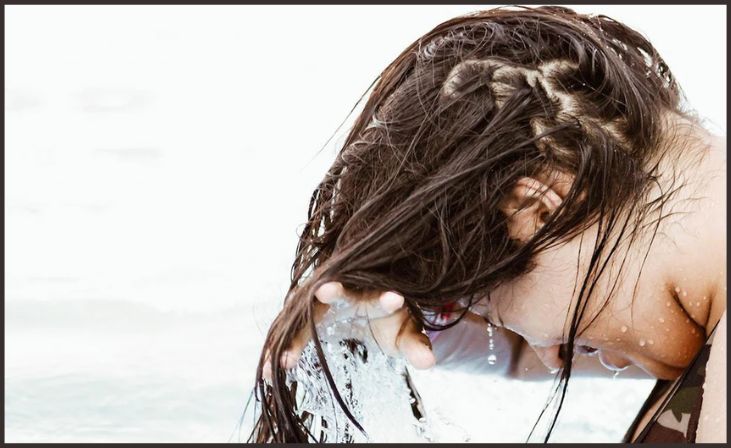A lustrous mane often begins with a healthy scalp. Your scalp, the foundation from which every strand of hair emerges, plays a pivotal role in the overall health and vitality of your locks.
Yet, in the hustle of our daily lives, we often overlook the care our scalps truly deserve. From dandruff woes to hair loss concerns, an array of scalp issues can mar the beauty of your tresses.
But fear not, for this comprehensive guide is here to enlighten you on the secrets tips for healthier scalp and, consequently, more vibrant hair.
In the pages that follow, we will delve deep into the fundamentals of scalp health, exploring the nuances of proper hair care, the influence of nutrition, the power of natural remedies, and the art of stress management.
We will uncover the detrimental practices that must be avoided, shed light on the significance of regular scalp massages, and guide you in choosing the right hair products tailored to your scalp’s unique needs.
Whether you’re dealing with persistent dandruff, an itchy scalp, or simply aiming for a luxurious crown of hair, these tips and techniques are your passport to a revitalized scalp and the radiant hair you’ve always dreamed of.
Let’s embark on this journey tips for healthier scalp, happier hair, starting right from the roots.
Healthy Scalp

A healthy scalp is one that is clean, well-moisturized, and free from irritation or inflammation. It’s balanced – neither too oily nor too dry – and devoid of visible issues like dandruff, redness, or excessive flakiness.
Also Read: Get Active Get Beautiful: Exercises for Hair Growth
Functions of the Scalp
- Hair Follicle Nourishment: The scalp houses hair follicles, the tiny structures from which hair grows. These follicles require adequate nourishment and oxygen, both supplied by a healthy scalp, to produce robust hair strands.
- Sebum Production: Sebum, an oil naturally produced by the scalp, conditions the hair, keeping it soft and manageable. However, excess sebum can lead to oily scalp issues.
- Natural Defense: The scalp acts as a natural barrier, protecting your head from environmental pollutants, UV rays, and other harmful elements.
Common Signs of an Unhealthy Scalp
- Dandruff: Flaky, white or yellowish scales on the scalp indicate dandruff, often caused by a fungus called Malassezia. It leads to itchiness and irritation.
- Dry Scalp: Insufficient moisture in the scalp can cause dryness, leading to itchiness and the formation of small, white flakes.
- Oily Scalp: Excessive sebum production results in an oily scalp, making the hair greasy and prone to clumping together.
- Inflammation: Conditions like scalp psoriasis or eczema can cause redness, swelling, and discomfort.
Proper Hair Care Tips for Healthier Scalp
Maintaining a healthy scalp is not just about washing your hair regularly; it involves a holistic approach that encompasses proper cleansing techniques, suitable hair products, and consistent care. Here’s a detailed look at the steps you can incorporate into your daily routine to ensure your scalp stays clean, balanced, and vibrant.
Choosing the Right Shampoo and Conditioner

Selecting suitable products is paramount for scalp health. For oily scalps, opt for clarifying shampoos to remove excess oil. Dry scalps benefit from moisturizing shampoos and conditioners, replenishing lost moisture. Sensitive scalps require mild, fragrance-free options to avoid irritation.
Those with normal scalps can use balanced products. Check labels for sulfate and paraben-free formulations. Regular use of matching shampoo and conditioner tailored to your scalp type ensures proper cleansing and conditioning, promoting a healthier scalp and vibrant hair.
Frequency of Hair Washing

The frequency of hair washing depends on your scalp type and lifestyle. Oily scalps may require washing every other day to manage excess oil. Dry scalps benefit from less frequent washing, around 2-3 times a week, to preserve natural oils. Normal scalps can typically be washed 2-4 times a week.
Overwashing can strip the scalp of essential oils, leading to dryness. Listen to your scalp’s needs, finding a balance that maintains cleanliness without over-drying, ensuring your scalp stays healthy and your hair remains vibrant.
Tips for Proper Washing

During washing, use gentle, circular motions with your fingertips to massage the scalp, promoting blood circulation and hair growth. Thoroughly rinse both shampoo and conditioner to prevent residue buildup. Avoid hot water; opt for lukewarm water to prevent scalp dryness.
After washing, pat your hair gently with a towel, minimizing friction. For optimal results, consider a final rinse with cold water to seal hair cuticles, enhancing shine and preventing frizz. These techniques ensure effective cleansing without compromising your scalp’s natural balance, promoting a healthier, more vibrant mane.
Avoiding Hot Water

Hot water can strip your scalp of its natural oils, leading to dryness and irritation. When washing your hair, opt for lukewarm water instead of hot water. Lukewarm water effectively cleanses without depleting the scalp’s essential oils.
It maintains a healthy balance, preventing dryness and promoting a vibrant scalp. Additionally, for the final rinse, use cold water. Coldwater seals the hair cuticles, enhancing shine and reducing frizz, ensuring your hair and scalp stay nourished and healthy.
Drying Techniques

After washing, gently pat your hair with a soft towel to absorb excess moisture, avoiding rough rubbing that can cause breakage. Whenever possible, let your hair air dry naturally. If you must use a hair dryer, choose a low-heat setting and maintain a safe distance to prevent scalp and hair damage.
Heat protectant sprays can minimize heat-related harm. Proper drying techniques safeguard your scalp’s moisture, preserving its health while ensuring your hair remains strong, shiny, and vibrant.
Balanced Diet and Scalp Health

A balanced diet isn’t just essential for your overall health; it significantly impacts the health of your scalp and hair too. The nutrients you consume play a crucial role in maintaining scalp health, ensuring proper circulation, and fostering the growth of strong, luscious hair. Here’s how your diet can directly influence the vitality of your scalp:
Essential Nutrients for Scalp Health
- Proteins: Hair is primarily made of a protein called keratin. Consuming an adequate amount of protein ensures your body has the building blocks it needs for hair growth.
- Vitamins and Minerals: Vitamins like A, C, and E, along with minerals like zinc and biotin, are essential for maintaining a healthy scalp. They promote sebum production, improve blood circulation, and prevent hair follicle damage.
- Omega-3 Fatty Acids: Found in fish, flaxseeds, and walnuts, these healthy fats nourish the scalp, reducing inflammation and promoting hair strength.
Foods that Promote Scalp Health
- Fruits and Vegetables: Rich in vitamins and antioxidants, fruits and vegetables contribute to a healthy scalp. Berries, citrus fruits, spinach, and carrots are particularly beneficial.
- Lean Proteins: Incorporate lean sources of protein like poultry, fish, tofu, and legumes. These provide the necessary amino acids for hair growth.
- Healthy Fats: Avocados, nuts, seeds, and fatty fish contain healthy fats that moisturize the scalp and prevent dryness.
- Whole Grains: Opt for whole grains like brown rice, quinoa, and whole wheat bread. They provide a steady release of energy, ensuring your scalp receives consistent nourishment.
Also Read: Unveiling the Allure of Pretty Spring Haircuts
Hydration and Its Impact on Scalp Moisture
- Importance of Water: Staying well-hydrated is fundamental for a healthy scalp. Water keeps the scalp moisturized, preventing dryness and flakiness.
- Limiting Dehydrating Drinks: Minimize the consumption of caffeine and alcohol, as they can dehydrate your body and, consequently, your scalp.
Supplements for Scalp Health
- Consultation with a Professional: If your diet lacks certain nutrients, consider supplements after consulting a healthcare provider. Biotin and fish oil supplements are popular choices for promoting hair and scalp health.
Natural Remedies for a Healthier Scalp

Nature offers a myriad of remedies that can rejuvenate your scalp, promoting optimal hair health without the use of harsh chemicals. These natural ingredients, rich in vitamins, minerals, and antioxidants, can address common scalp issues and nourish your hair from the roots. Let’s explore some potent natural remedies to achieve a healthier scalp:
1. Aloe Vera
- Benefits: Aloe vera possesses anti-inflammatory and antimicrobial properties, making it effective against dandruff and scalp irritation.
- Application: Extract fresh aloe vera gel and apply it directly to your scalp. Leave it on for 30 minutes before rinsing with lukewarm water.
2. Tea Tree Oil
- Benefits: Tea tree oil has strong antifungal properties, making it excellent for treating dandruff and itchy scalp conditions.
- Application: Mix a few drops of tea tree oil with a carrier oil (like coconut oil) and massage it gently onto your scalp. Leave it overnight and wash off the next morning.
3. Coconut Oil
- Benefits: Coconut oil is rich in fatty acids that moisturize the scalp, preventing dryness and flakiness. It also has antimicrobial properties.
- Application: Warm coconut oil slightly and massage it into your scalp. Leave it on for at least an hour, or overnight, and then wash your hair as usual.
4. Apple Cider Vinegar
- Benefits: Apple cider vinegar balances the pH of the scalp, reducing dandruff and promoting a healthy scalp environment.
- Application: Mix equal parts of apple cider vinegar and water. After shampooing, apply the solution to your scalp and let it sit for a few minutes before rinsing thoroughly.
5. Olive Oil
- Benefits: Olive oil is rich in antioxidants and helps in moisturizing the scalp, preventing dryness and itchiness.
- Application: Warm olive oil and massage it into your scalp. Cover your head with a shower cap and leave it for 30 minutes to an hour before washing your hair.
Conclusion
In nurturing a healthier scalp, you’ve unlocked the secret to radiant, resilient hair. By understanding the nuances of scalp health, adopting proper care routines, and embracing natural remedies, you’ve laid the foundation for vibrant tresses. Remember, your scalp is the root of your hair’s vitality. With these tips, you’re not just caring for your scalp; you’re embracing a lifestyle that nurtures your hair, ensuring it gleams with health and beauty. Here’s to your vibrant mane and a scalp brimming with vitality!
FAQ
The frequency varies based on your scalp type. Oily scalps may need washing every other day, while dry scalps can benefit from 2-3 times a week.
Yes, natural remedies like aloe vera, tea tree oil, and coconut oil have proven benefits. They contain antioxidants and antimicrobial properties that soothe the scalp, reduce inflammation, and promote a healthier environment for hair growth.

